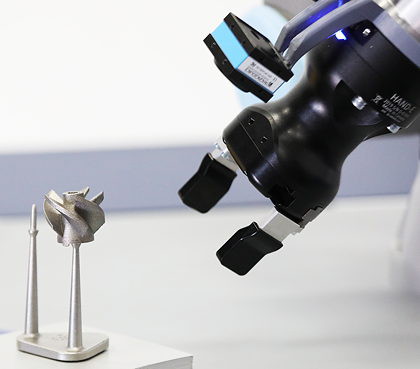- Home » News » Technology News
OS transforms cobots into ‘intelligent collaborators’

A Californian start-up has announced an AI-based robotics OS (operating system) that, it claims, will transform collaborative robots (cobots) into intelligent co-workers on manufacturing floors. After two years of r&d – including installations at major automotive manufacturers – Qobotix has unveiled its technology designed to make robots smarter and self-learning.
Powered by proprietary AI (artificial intelligence), machine vision and kinematics, the Qobotix OS co-ordinates industrial automation systems with cobots. Its plug-and-play technology allows intelligent factory systems to perform complex tasks that previously required humans. The company is also offering complete robot stations that can be deployed rapidly for a variety of tasks on production lines.
Qobotix asserts that its technology will allow manufacturers to boost productivity, cut costs and simplify processes such as inspection, picking, packing and assembly. Its Qobotix Cloud offers a factory management platform with a centralised repository of work intelligence that can be shared between machines to manage production analytics and to assess robot performance.
Qobotix is seeking early adopters for its technology and aims to supply 20-50 robot stations during its first year, with deployment, training and testing being completed in one day.
The company is the brainchild of Avi Reichental, a 3D printing pioneer, Egor Korneev, an entrepreneur and machine learning and vision systems pioneer, and George Votis, the chairman, CEO and founder of the US machinery manufacturer, Galt Industries. They spotted what they think is a gap in the market and decided to develop their own technology with the aim of bringing vision and intelligence to collaborative robots, and freeing humans from repetitive tasks.
“During our many years involved in industrial manufacturing, we experienced robots that were meant to be collaborative and quickly concluded they were not like that at all – they couldn’t see or hear, and they were very inflexible,” says Reichental.
“Our aim is to take robotics out of the late 1990s,” adds CEO Korneev. “In the early 2000s, hardware companies dominated the mobile phone and device markets and the mobile applications ecosystem was weak with no common OS options. The advent of iOS and Android led to an explosion in mobile software applications based on open OS platforms. We are now in a similar place with cobots with Qobotix offering a universal operating system for industrial robots driven by AI as a platform for automation applications.”

One of Qobotix’s claimed innovations is that it enables robots to learn independently – unlike existing industrial robots that are pre-programmed to perform one task, humans can train robots by interacting with them and robots can learn from other robots. This allows robots to be programmed in hours or days, rather than weeks. Users can deploy robots faster, with more flexibility, to perform functions with accelerated human-machine collaboration, allowing humans to take on other roles.
Qobotix’s launch comes as the Covid-19 pandemic is shaking up supply chains. Companies are re-examining their reliance on repetitive production performed offshore, and seeking more flexible, localised manufacturing. Qobotix says it can help companies meet the challenge of becoming better equipped to meet these new conditions and move away from inflexible factory designs and manufacturing processes. Using its technology, factories can use cobots to switch more easily and quickly between projects, produce at a high volume for shorter times, and keep workers safe through social distancing.
“Qobotix marks a milestone in the manufacturing and services industries,” argues Reichental. It “changes the game for manufacturing and services by eliminating time-consuming processes such as programming to significantly lower costs and increase output. This presents a huge opportunity for all manufacturers in their everyday operations.”
“Qobotix offers a strong return on investment by freeing up people for higher level tasks,” adds Votis. “With Qobotix, robots can more easily collaborate with each other, and allow manufacturers to deploy production stations within different production lines each day, saving time and costs while boosting productivity.”





